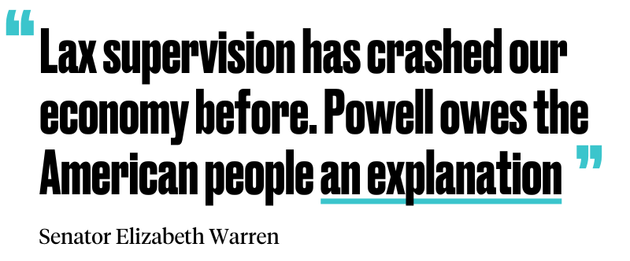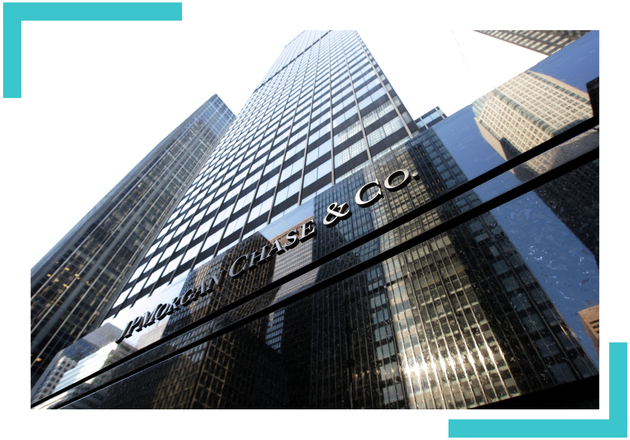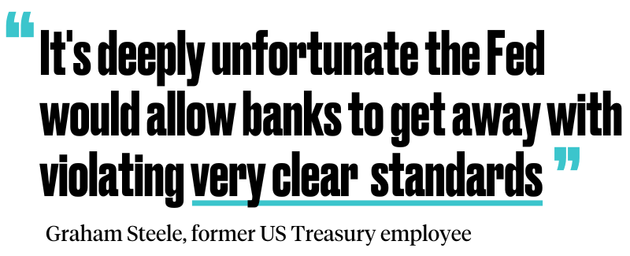
‘Turning a blind eye’: Elizabeth Warren blasts Federal Reserve for letting JPMorgan ‘cook the books’
Misreporting of trading activity throughout Wall Street risks financial crash while inflating executive pay
Senator Elizabeth Warren has slammed the Federal Reserve for allowing US banks to break rules designed to prevent another financial crisis and avoid huge taxpayer bailouts.
A JPMorgan whistleblower said the world’s biggest bank was misreporting its trading activity, which could have inflated its earnings by billions of dollars and added millions to executive pay packages. They reported the issue in a letter sent to board members, the Federal Reserve and the financial regulator, the Bureau of Investigative Journalism (TBIJ) and the International Consortium of Investigative Journalists (ICIJ) can reveal.
Another banker familiar with the matter said other major US banks were doing the same – with tacit approval from the Federal Reserve, the US central bank.
Warren, a Democrat and leading voice on accountability in the financial sector, said: “I am deeply concerned that the Fed may be turning a blind eye as JPMorgan and other Wall Street banks cook their books and skim off funds meant to prevent a global economic collapse. Inconsistent and lax bank supervision has crashed our economy before.
“[Federal Reserve chair Jerome] Powell owes the American people an explanation for allowing CEOs to manipulate their financial reports so they can pay themselves and their wealthy investors more in executive compensation and buybacks.”
Global contagion
In the wake of the 2008 financial crisis, regulators around the world agreed on a set of rules designed to prevent another scenario where taxpayers were forced to bail out the banks. A key area of focus was ensuring that banks held enough capital to stay afloat in the event of another financial crash.
Under the rules, which the Federal Reserve is responsible for upholding in the US, banks considered “too big to fail” must submit data on the trading they are doing, which determines how much capital they are required to hold against potential losses.
The JPMorgan whistleblower said the bank had been deliberately underreporting this data ever since the rules were introduced in 2016. This would have artificially reduced the reserves it was required to hold by an estimated $7.5bn per year.
Another former JPMorgan banker who worked in this area and has since moved to another bank said they understand that other US banks take this approach to reporting their trading activity.

Graham Steele, former assistant secretary for financial institutions in the US Treasury, said: “If [banks] don’t have enough capital for times when they experience financial stress, that is putting their domestic economies at greater risk because it’s eroding their ability to absorb losses.
“It also imposes risks on the global financial system. They will spread risk and contagion because these are global financial institutions and global financial markets.”
The revelations come at a critical time. The Federal Reserve is already under fire for caving to pressure from US banks, which last year lobbied successfully against a proposal to increase the amount of capital they are forced to hold. Earlier this month Michael Barr resigned as the Fed’s head of supervision ahead of Trump's second term, reportedly to avoid a potential conflict with the incoming president.
Breaking the rules
The flouting of these rules in the US risks undermining similar pledges made around the world. The Federal Reserve is a member of the Basel Committee, an international organisation that develops minimum regulatory standards. The framework is not legally binding but members agree to fully implement it.
David Aikman, professor of finance at King’s College London, said: “No individual country will want to penalise its own large banks. They’ll only sign up to those rules if they think everybody else is applying the rules faithfully.”
 The JPMorgan whistleblower said that the bank’s misreporting could allow it to make an extra $2bn a year
Wolterfoto / Ullstein Bild via Getty
The JPMorgan whistleblower said that the bank’s misreporting could allow it to make an extra $2bn a year
Wolterfoto / Ullstein Bild via Getty
A Federal Reserve spokesperson did not answer a question by ICIJ and TBIJ about whether it allowed banks to interpret the rules in this way. Instead, they pointed to the higher amounts of additional capital that large US banks must hold and the advisory nature of the Basel framework.
The spokesperson said: “The largest and most complex US banks are required under Fed rules to have substantially higher capital surcharges than their international counterparts and substantially higher capital surcharges than specified under the non-binding Basel Accord.”
Steele said the Fed’s failure to clarify its position on this rule was concerning. “It’s deeply unfortunate that [the Federal Reserve] would allow the banks to get away with violating very clear domestic and international standards, but even more shocking to do it in a way that’s so opaque.”
He said it would raise issues of fairness if other US banks were not similarly aware of the Fed’s position.
Gaming the system
Executives at the biggest US banks have made no secret of their opposition to holding more capital – assets that could otherwise be invested, distributed to shareholders or loaned out. In other words, that capital could be making the bank money.
Jamie Dimon, the CEO of JPMorgan, said in 2023: “We’ve got our smartest people figuring out every angle to reduce capital requirements for JPMorgan.”

One way for a large US bank to game the capital rules would be to understate its trading activity. Banks that undertake more trading are considered to pose a greater risk to the financial system and so are forced to hold larger amounts of capital.
Often bank trading desks hold both “long” and “short” positions in shares and other financial products – meaning they buy the shares assuming their price will rise, but also take an opposing bet that the value of those shares will fall.
If they offset their long positions – the shares they hold – with their short positions when reporting to the regulator, the amount of trading they are doing will look smaller and the bank will appear less exposed.
But Federal Reserve rules, based on the Basel framework, specifically prohibit banks from doing that, stating that they should “report values on a gross long basis (ie do not net short positions against long positions)”.
In the letter to JPMorgan board members dated August 2023, the whistleblower said the bank was breaking this rule by netting long and short positions when they were held in the same legal entity. They wrote that they were part of a team at JPMorgan that raised this as an issue in 2018. Together with colleagues they discovered that this approach had the result of understating the bank’s capital requirements by half a percentage point.
Calculations based on JPMorgan’s own estimates suggest that could free up $7.5bn, enabling the bank to make $95bn more in loans. The whistleblower calculated that, based on JPMorgan’s profit margins, that could generate net income of more than $2bn in one year alone. “The cumulative effect over multiple years of this conduct is staggering,” they wrote.
 JPMorgan CEO Jamie Dimon made more than $30m in 2023 based on his bank’s performance
Jeenah Moon / Bloomberg via Getty
JPMorgan CEO Jamie Dimon made more than $30m in 2023 based on his bank’s performance
Jeenah Moon / Bloomberg via Getty
That would have a knock-on effect on executives’ bonuses, which are closely linked to earnings. In 2023, $34.5m of Dimon’s pay package was directly linked to the bank’s performance.
As well as raising the issue internally, the whistleblower said they had briefed the Federal Reserve and the Securities and Exchange Commission, a financial regulator, in 2022.
JPMorgan told TBIJ and ICIJ that the bank fully complies with all capital regulations and is confident in its methodology, which “is fully transparent to our regulators”. It did not answer a question about whether the approach detailed by the whistleblower accurately reflected its policy.
The other former JPMorgan banker suggested the bank had not sought approval for its interpretation of the rules from the Federal Reserve. “US firms are kind of discouraged from making the regulators their interpretive offices,” they said.
“Supervisors expect the banks to have expertise, to do their work and then it’s subject to review. It’s less asking for permission up front and more doing the interpretations and being subject to being told that they’re wrong.”
A spokesperson for the Financial Services Forum, which represents the largest banks in the US, said: “[The largest US banks] face significantly higher capital requirements than other banks domestically and globally, with regular, mandatory data submissions subject to rigorous oversight.”
Lead image: Kevin Dietsch / Getty Images
Reporter: Josephine Moulds
Editor: Franz Wild
Production editor: Alex Hess
Fact checker: Jasper Jackson
TBIJ has a number of funders, a full list of which can be found here. None of our funders have any influence over editorial decisions or output.





